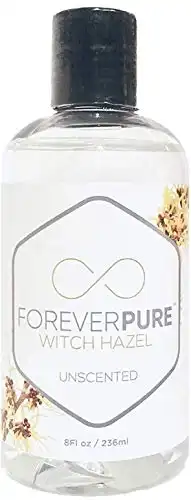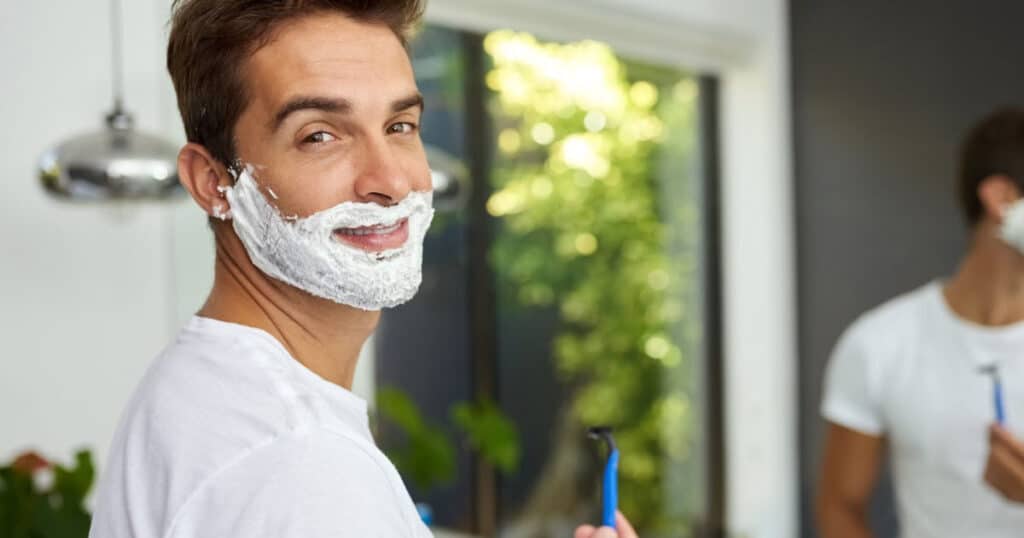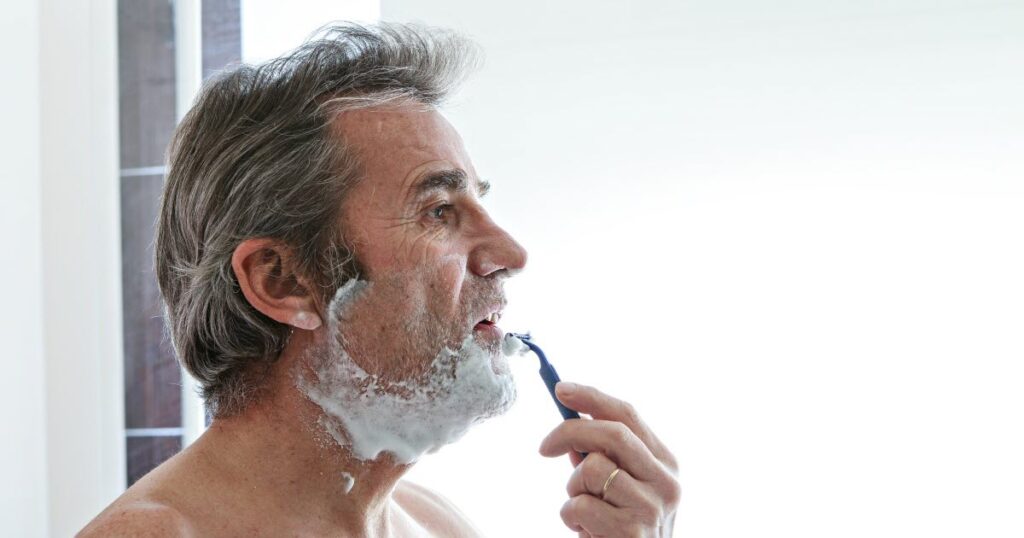In this post, we’ll discuss some skin care tips for wet shavers, that you, as a man / wet shaver, should keep in mind. Some of these are fairly common knowledge, and you’ll find them mention on literally every single website that deals with men’s grooming or men’s health (like “Avoid Sun Damage”), but others may be less obvious (like, “Be Vain”).
We’ll start with the one most familiar to us:
The Quality of Your Shave Affects the Quality of Your Skin
It’s the truth: shaving improperly, or with the wrong tools, can do a number on your skin. It can lead to ingrown hairs, razor bumps, acne, skin irritation, and run-of-the-mill nicks and cuts. How you shave, and the tools you use to shave, makes a big difference in the health of your skin.
We’re creating this entire site to help men learn how to shave (and to enjoy doing it), so you can peruse at your leisure, but here are a few high-level tips that will keep your skin fresh and clean and smooth:
Always Make Sure Your Blade is Sharp. Have you ever gotten a really bad cut that resulted in a visible scar? Shaving is basically a daily opportunity to cut your skin, and every nick you can cause microscopic damage to your skin. Dull or uneven razors nick the heck out of you, and if you shave with them—for the next ten, twenty, thirty, forty, fifty years—you can end up with a loooooot of skin damage. Make sure your blades are super sharp and super clean.
Skip the Multi-Blade Nonsense. The modern cartridge razor has made it easy to start shaving, and that’s a good thing. However, all those blades form an almost-perfect trap for dirt and debris and gunk and dead skin cells and a whole host of other things that irritate the skin. They’re almost impossible to wash out of the razor, no matter how often you rinse it. If shaving gives you sensitive skin, give electric razors a shot, or, even better, learn how to use a safety razor.
Figure Out Your “Problem Products.” Always be on the lookout for a particular product that messes with your skin. It may be a cream or a soap or an aftershave, but it’s not uncommon for a particular product to cause a reaction on your skin. Some men don’t have that issue—that can smear whatever they like on their skin, and be fine—but a surprising number of men suffer reactions from the crazy list of chemicals that are in most store-bought products.
Figure Out Your “Problem Techniques.” This is mostly geared towards wet shavers who use a safety razor or straight razor: do a couple of experiments and see whether going across the grain or against the grain causes you skin irritation. It’s most common for wet shavers to lather, shave with the grain, lather, shave diagonal to the grain, and then lather, and shave against the grain. That produces a super close / “baby butt smooth” shave. However, those last two passes—diagonal to the grain and against the grain—can cause irritation in some men, even with a safety razor or straight razor. Test it out to see if that’s an issue for you.
Try Pre-Shave Oil. If you’ve got sensitive skin, or you find that you cut your skin to ribbons during your shave, give pre-shave oil a whirl, and apply it before you apply your shaving soap or shaving cream. It’ll help moisturize your skin before the shave, soften your whiskers, and lead to fewer nicks. Plus it feels really nice and smells good.
Got Razor Bumps? Salicylic Acid is Magic. We discuss this a little more in depth in one of the following sections, but if you’re getting razor bumps, check out a shaving cream that contains salicylic acid. It’s a magical substance that unclogs your pores, and it helps fight whiteheads and blackheads.
Don’t Dry Shave. Unless you’re using an electric shaver, dry shaving is lunacy. There are certain electric razors where you don’t need shaving cream, and those machines are literally designed to be used without shaving cream. As for every other razor you’ll ever find, you’re going to want to use shaving cream. Skipping is more likely to lead to ingrown hairs, skin irritation, acne, and nicks on the skin, even in people who usually have skin that’s pretty resilient.
Don’t Forget Aftershave Balm. This is a nice extra step that a lot of guys ignore. It’s easy to forget that when you shave, you’re dragging a razor across the very sensitive skin on your face. Even if you do it every single day, your face never truly adjusts to it, and it needs a little TLC afterwards. Aftershave soothes the skin, and provides some much-needed rehydration. Just remember, you want an aftershave with NO alcohol—alcohol dries the skin, and for a lot of guys, it stings like a beast. If you haven’t already, try witch hazel after shaving.
"If your skin doesn’t tolerate alcohol, then this formula can help soothe and tighten your skin gently after a shave. The only drawback to this witch hazel is the smell. This extract is unscented, so the pure, woodsy witch hazel smell can be a little unpleasant to some."
- RTG Editorial
Next up in our “Skin Care Tips for Wet Shavers” list…

Stay Away from the Bars
Kidding! Go to bars as much as you want. They’re good for you. Stay away from soaps in the shape of bars. Those are bad for you.
This is news to a lot of men, but not all soaps are created equal, and bar soaps have a tendency to dry out the skin—particularly the skin on your face. According to skincare expert Renee Rouleau, it’s not the cleaning agent in bar soap that’s bad for your facial skin, it’s the chemical agents the hold an actual bar of soap together that cause it to dry out the skin. Irish Spring is an example of one such soap—for a lot of guys, it’s great and there are no issues; for some other guys, it’ll dry out your skin like the desert sun.
So what do you use instead? Cleanser. Those can be a little mysterious—most men don’t really know what cleansers do, or what they’re made out of—but they’re basically liquid or cream soaps that are made specifically for the skin on your face, as the skin on that area in your body has a lot of characteristics that make it unique compared to the skin on the rest of your body.
Washing your face with a cleanser is an extra step, especially if you’re the kind of guy who likes to hop in the shower with a bar of soap and a bottle of shampoo and be done with it, but it can make a difference in the long run, and it can REALLY make a difference in you’ve got sensitive skin or dry skin.
If you’re going to stick with bar soap, that’s totally up to you—just make sure that it’s one of the fancier types, that include Vitamin E oil (which supports new skin cell growth), jojoba oil (which has anti-inflammatory and antibacterial characteristics that heal the skin), and olive oil (which hydrates the skin—the very thing that bar soaps don’t do).
Skin Care Buying Words, Decoded
If you’ve got any kind of skin sensitivity issues, there are some advertising phrases you’ll see again and again when you’re buying any kind of skin care product, be it a soap or shaving cream or whatever:
Fragrance Free. It’s kind of amazing how many products have added chemicals that smell good, but it’s a BIG thing, and it’s a big selling point for a lot of products. You can buy beard balms that smell like eucalyptus, aftershaves that smell like citrus, shaving creams that smell like sandalwood, and so on, and a lot of those products are pretty magnificent. The only problem is that a LOT of them include dyes and chemicals that can irritate your skin to no end. Here’s the rub: the phrases “Fragrance Free” and “Unscented” mean absolutely nothing, because manufacturers can use “masking fragrances” in those items, and your skin will have the same irritated reaction. Instead, look for the term “sensitive skin.” Items with that advertise that phrase are less likely to irritate your skin if you have issues with fragrances.
Non Comedogenic. There are quite a few chemicals and compounds that are known to cause acne, and quite a few of those chemicals make it into soaps, lathers, creams, and so on. That would seem a little bit weird, but it makes sense, in a way: a lot of those chemicals have other benefits (some provide the product with color or consistency), and because most people don’t have a reaction to these chemicals, manufacturers include them. Those additives that cause acne are known as “comedogenic,” and a “non comedogenic” product is made without those additives. Keep in mind, there are no federal laws regarding a manufacturer’s use of the term “non comedogenic,” so, basically, it means that the manufacturer has done its best to put together a product that won’t make you break out. Nonetheless, if you’re the kind of guy who’s prone to acne, it may make sense to keep an eye out for non comedogenic products, ESPECIALLY non comedogenic sunscreen, which causes a lot of guys to break out.
Hypoallergenic. This is another term that doesn’t mean anything in a legal sense—as in, there are no laws or regulations that dictate the use of the term—but a lot of guys find it helpful. Just like the term “non comedogenic,” “hypoallergic” means that the manufacturer of the product made it without certain chemicals or additives that cause allergic reactions. It doesn’t mean that it’s 100% certain not to cause an allergic reaction—just that it’s less likely to cause an allergic reaction. Again, though—if you’ve got sensitive skin or allergies, it may help.
Do these products work? For some dudes, yes! For others, no. You’ll have to figure it out on your own, through some trial-and-error.
If You’ve Got Acne…
Fun fact: of all the skin disorders in the world, acne is the most common. Chances are, at some point in your life, you’re going to get acne. It’s a bummer, but it is what it is. So, here are a couple of ways to fight it.
Have a Routine Washing Schedule, But Don’t Overdo It. Use a gentle cleanser and warm water twice a day—once in the morning, and once at night. This is a preventative measure—it may not clear acne that you already have, but it may help keep you from getting it in the future. Remember, too much face-washing will dry out your skin, and may irritate it further or cause more acne. As much as you may want to do, it may be unwise to wash more than twice a day.
Be Specific About the Cleanser You Use. You’ll want one that’s specifically created to fight acne, and those ones that usually contain one or more of the following: salicylic acid, benzoyl peroxide, glycolic acid, and/or sulfur. These compounds work by unclogging pores (salicylic acid), fighting the bacteria that causes acne (benzoyl peroxide), slowing the growth of certain bacteria that cause acne (glycolic acid), and by removing the dead skin cells that can clog pores and cause acne (sulfur).
Find Your “Trigger” Foods. This is perhaps the least studied item in this list, but for some people, it makes a BIG difference: diet. There are a lot of different causes of acne, and the most commonly-referred to cause is an excess of an oil called “sebum” in the skin. That’s the culprit that most people think of, when they think of acne: clogged pores and an overproduction of oil. It’s a lot more complicated than that, though, and scientists are finding that there are a LOT of causes of acne, and the foods a person consumes can be a major factor in the development of acne. Unfortunately, it’s difficult to tell what food, exactly, is causing acne, but the “usual suspects” include dairy, gluten, sugar, corn syrups, vegetable oils, candy and chocolate, spicy foods, and caffeine (in other words, the foods that make life worth living). If you’ve tried every type of soap, shaving cream, cleanser, etc. that you can think of and you’re still getting acne, try removing a particular type of food from your diet for a while, and see what happens. There’s a LOT of anecdotal evidence that certain foods cause acne in certain people, so being careful with your food intake may be the trick that clears up your skin.
This next tip is good for acne sufferers, but is also one of our favorite skin care tips for wet shavers:
Drink More Beer
Sorry, that’s “water.” Not “beer.” Drink more water.
We spoke earlier about ditching the bar soap that dries your skin, and making sure that your skin is properly moisturized. But that’s only half the story, because the moisture in your skin comes from the foods and liquids you consume.
So one of the best ways to take care of your skin in the long-term is to keep hydrated. Drink lots of water (experts say six to eight glasses a day, but that seems like a lot—just make sure you’re drinking water every day) and avoid the things that dehydrate you (like coffee and alcohol). If straight-up water isn’t something you enjoy, add some lemon or honey or mashed-up strawberries or cucumbers or whatever. Go to natural foods store and get some cranberry / blueberry / cherry / mango juice and add a few tablespoons to sweeten it. And, if you want a little kick, add some mango juice and a little Tabasco sauce. Mmmmmm, sweet and spicy. So good.
Also, make sure you’re drinking more water if you’re exercising, which you should be, because…
Exercise is Good for Just About Everything
Your skin, your bones, your muscles, even your MOOD. Exercise is incredible. Think about that, for a second: moving your body can make you happy. That’s amazing!
Why don’t people exercise more often? It’s crazy. Exercise is good for you in DOZENS of ways, and yet people will find a dozen excuses to ditch the gym and sit and watch television / Netflix / Hulu / whatever, which is interesting and stimulating, but not quite good for you.
The trick to exercise, honestly, is to find what you love. If you like biking, hop on a bike. If you like jiu jitsu, get yourself to the dojo. If you like basketball, find yourself a local court. If you like the gym, go to the gym.
But… if you don’t like the gym, stay the heck away from the gym.
For some reason, most people—adults, in particular—equate being fit with going to the gym. It’s unclear why that is, but it’s probably because we’ve all seen thousands of commercials that basically say, “If you want to get fit, you need to go to a gym!” It’s not at all factual, but it seems like a given for most people: if you ask them if they need to get fit, they’ll say, “Yeah, I need to get to the gym.”
Here’s the thing: thinking that you have to go to a gym to be fit is something that actually keeps a lot of people from being fit and healthy, because a lot of people find going to the gym very, very dull.
We, by no means, want to insult gym goers. Most of the writers at Rough and Tumble Gentleman love going to the gym, and if the gym is your thing, then do you thing, man. More power to you (literally). MILLIONS of people go to the gym, and their lives are better for it.
But if you DON’T like going to the gym—if the endless cycle of signing up for a gym, going a few times, losing motivation, calling to see if you can cancel your membership, and then signing up the following year when you re-realize that you need to get fit—if that doesn’t do it for you, then the gym is not for you, and you need to fit something else that interests you. The sooner you realize that, the sooner you’ll find a healthy activity that keeps you motivated and interested. There are literally thousands of ways to get fit, so get creative: racquetball, fencing, cricket, capoeira, you name it. Find what works for you.
This is a long way of saying, exercise is really important to the health of your skin, so exercise.
The Sun Will Mess You Up
Exposure to the sun will do incredible damage to your skin: in the short term, it can lead to sunburns, aches, and fever; over the long term, it can lead to wrinkles, spots, even skin cancer. Proper protection from the sun’s rays is important, and luckily, it doesn’t take too much effort to protect yourself.
If you’re going to be outside with most of your clothes on (like on a hike or in a park or wherever), be sure to apply a little quality sunblock to whatever areas of your skin will be exposed to sunlight (most likely your face and your arms). If you work outside and most of your time is spent in the sun, it’s incredibly important to use sunblock, because spending every single day in the sun will do a number on your skin over the course of a few years. Tip for older dudes: that includes an area of your body that *used* to be covered in hair, and now is not. A sunburn on the top of your head is probably no fun.
If you’re going to be outside with a lot of your clothes off (like down the shore or at a lake house), cover absolutely everything. It may take a while, but the alternative is nooooo fun, especially if you’re sun-sensitive. Here’s a tip: if it takes you forever to properly apply sunscreen to your face, chest, stomach, back, legs, etc., then use a spray blocker. They’re quick and they’re super effective (although very often, you need to reapply once or twice). It can save a lot of valuable beach time. Here’s another tip: don’t always ditch the sunblock because it takes a long time to apply. If you’re at the beach with a special someone, putting on sunblock can be a fun, flirty, intimate experience, and why would you want to miss that? Take your time, and make sure you get it right!
If you like to tan, don’t overdo it—use a sunblock that won’t totally block the sun’s rays from reaching your skin, but will still provide adequate protection while you get a little color.
STOP. SMOKING.
This one is simple: stop smoking. Just stop it. There are dozens of reasons to stop smoking (most of which are more serious than simply having good skin), but if you’re worried about your skin, smoking is ridiculously, ridiculously bad for you. Have you ever seen a person who’s for 40 years? Or who was an avid sunbather for 40 years? Chances are his/her skin looks likes like an old leather wallet. You can avoid that by simply not smoking.
The worst part is, cigarette smoke can damage your skin even if it’s not YOU who’s doing the smoking. If the people you hang out with—your friends or family—smoke, you’re doing damage to your skin, lungs, and overall healthy when you inhale their second-hand smoke. The dangers of second-hand smoke have been well-documented, and in many cases it’s just as bad as smoking.
If you’re not a smoker, second-hand smoke isn’t as much a problem as it used to be—it used to be, you could smoke nonstop in any bar in the United States, and at the end of the night, absolutely everybody in the place stank of cigarettes—but it’s still something to be wary of.
It’s often said that people who smoke do so because cigarettes relax them, but that’s ironic, because usually not having a cigarette is what’s stressing them out in the first place. That said, stress and anxiety are actually triggers for a lot of people. So…
Relax, Man
Believe it or not, skin disorders related to stress are a real thing, and many of the skin disorders that people seek treatment for are cured when the stressor passes. Acne, hives, rashes, and a number of other skin disorders can be directly linked to stress, and if you’ve noticed a flare-up in skin issues around final exams, busy periods at work, or times of interpersonal conflict, that may be why.
If you think you may have acne or other skin disorders related to stress, you need to do two things: 1) Relax, and 2) Make being relaxed a central point of your lifestyle.
That can mean making it a priority to chill out with a book, take a steam in the sauna after a workout, or do some daily meditation, which is an incredibly effective way to diminish feelings of stress, anxiety, and depression. The easiest meditation is perhaps one of the most popular—it’s called Mindfulness Meditation—and it takes only ten minutes a day. (Exercise, by the way, is a great natural relaxer, and that’s ANOTHER way in which it helps you maintain healthy skin.)
This is another one of those “you-gotta-find-what-works-for-you” sorts of cures, but it’s important.
Be Vain
Skin care is… kind of a hassle, no? You come home from the bar, you had a great night, you’re tired and you want to crawl into bed. At that moment, sleep seems a lot more important than trudging into the bathroom and washing the sweat and dirt from your face.
So how do you find a way to make skin care a priority in your life?
There’s one trait that can help a lot, and even though it’s got kind of a bad rap, it can help you stick to a skin care routine:
Vanity.
It’s true! Being vain is the secret to great skin care.
It’s an odd tip on how to keep your skin healthy, but it’s 100% true. If you can deeply about how you look, you’ll be more inclined to take the steps necessary to keep your skin clean and healthy. And, you’ll be more inclined to search for products that don’t irritate your skin, stick to diets that don’t irritate your skin, and develop habits that don’t irritate your skin.
Some people are able to decide on a course of action, and then force themselves to do it every day. It’s our observation that that’s not usually how humans work. People lack willpower and lose interest over time. Vanity—that is, a desire to look a certain way—is a lot more effective.
So make your appearance important to how you look! Take pride in your appearance. Dress well, groom well, shave well. You’ll feel more attractive, feel better about yourself, and your skin will improve as you make it a priority to take care of it. Embrace your vanity!
Wrapping Up Skin Care
It’s funny—if you were to boil down this list, it would read, “Wash your face with a cleanser, and do healthy things.” Skin care—especially for men—doesn’t need to be that complicated. Just incorporate a couple of good habits into your day-to-day, and your skin will thank you!
Michael Morris is the head writer here at Rough and Tumble Gentleman. He's got a ducktail beard and loves Brazilian jiu-jitsu. He's married to the woman of his dreams and lives in Brooklyn, NY.





